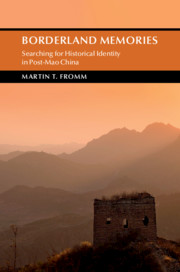Book contents
- Borderland Memories
- Cambridge Studies in the History of the People’s Republic of China
- Studies of the Weatherhead East Asian Institute, Columbia University
- Borderland Memories
- Copyright page
- Dedication
- Contents
- Acknowledgments
- Introduction
- 1 Reconfiguring Cultural Production in the Post-Mao Transition
- 2 Borderland Ambiguities in Narratives of Modernization and Liberation
- 3 Relocating the Nation outside the Nation
- 4 The “Historical Science” of Wenshi Ziliao
- 5 Affective Community and Historical Rehabilitation
- 6 Mobilizing a “Patriotic United Front”
- 7 Local, Regional, and National Dynamics of Wenshi Ziliao Production
- Conclusion
- References
- Index
- Studies of the Weatherhead East Asian Institute, Columbia University
3 - Relocating the Nation outside the Nation
Forging a Borderland-Centered Nationalist Discourse
Published online by Cambridge University Press: 18 February 2019
- Borderland Memories
- Cambridge Studies in the History of the People’s Republic of China
- Studies of the Weatherhead East Asian Institute, Columbia University
- Borderland Memories
- Copyright page
- Dedication
- Contents
- Acknowledgments
- Introduction
- 1 Reconfiguring Cultural Production in the Post-Mao Transition
- 2 Borderland Ambiguities in Narratives of Modernization and Liberation
- 3 Relocating the Nation outside the Nation
- 4 The “Historical Science” of Wenshi Ziliao
- 5 Affective Community and Historical Rehabilitation
- 6 Mobilizing a “Patriotic United Front”
- 7 Local, Regional, and National Dynamics of Wenshi Ziliao Production
- Conclusion
- References
- Index
- Studies of the Weatherhead East Asian Institute, Columbia University
Summary
In the context of China’s reintegration into the global market and thawing relations with the Soviet Union, wenshi ziliao participants revived the concept of “northern Manchuria” as a distinctive cultural space where Chinese entrepreneurial innovation flourished in a cosmopolitan environment alongside Russian influences. Editors used this memory-space, with its historical implications of regional distinctness apart from China proper and its associations with Russian colonialism, to promote regional claims to economic and cultural development that both conformed to and stood apart from nationalist narratives. Wenshi ziliao organizers re-conceived of the northeast borderland as a history of “liberation struggle” and “heroic resistance” that embodied China’s coming into being as a modern nation.Redefining marginality as centrality, they spoke to the historical concept of northern Manchuria as a unique geopolitical space outside of China proper while reclaiming it as a uniquely Chinese space at the forefront of the nationalist resistance story.This informed the ways in which local wenshi ziliao participants represented non-Han and non-Manchu ethnic minorities.Local historical investigators alternated between framing this ethnic diversity of non-Chinese traditions and histories in broad nationalist terms and incorporating it within narratives of local particularity.
Keywords
- Type
- Chapter
- Information
- Borderland MemoriesSearching for Historical Identity in Post-Mao China, pp. 75 - 109Publisher: Cambridge University PressPrint publication year: 2019

